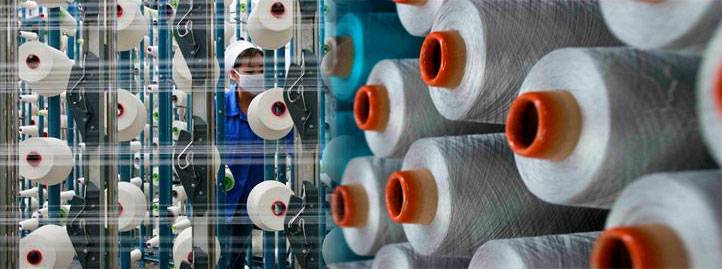ISLAMABAD - Pakistan’s textile exports had not increased despite the fact that the government had depreciated the currency and reduced the prices of electricity and gas.
The country’s textile exports had marginally enhanced by over one percent to $8.9 billion in eight months (July to February) of the ongoing fiscal year.
Meanwhile, the country’s overall exports had also shown 1.9 percent growth and recorded at $15.1 billion in July to February period of the 2018-19, according to Pakistan Bureau of Statistics (PBS).
The incumbent government had announced various incentives for the exports oriented sectors to boost the country’s exports. The government had depreciated the currency by around 25 percent as the dollar value had gone to Rs140.
Similarly, the government had also announced to reduce the gas and electricity prices for the exports oriented sectors. However, the exports had not increased so far despite all these measures.
“Impact of rupee depreciation would be visible in next five months,” said an official of the ministry of commerce last week. He further said that exports will pick up momentum and imports will record further steep decline in the months ahead.
In textile sector, according to PBS, exports of knitwear had enhanced by 11.36 percent during July to February period of the year 2018-19 over a year ago.
Similarly, exports of bed wear had also recorded an increase of 3.53 percent and exports of made-up articles had gone up by 2.12 percent. Meanwhile, exports of ready-made garments had also surged by 2.72 percent in first eight months of the current financial year.
The PBS data showed that exports of cotton cloth had recorded a decline of 1.04 percent.
Similarly, exports of raw cotton had tumbled by 72.49 percent. Exports of cotton yarn witnessed an increase of 13.53 percent.
Meanwhile, exports of towels had declined by 1.29 percent.
Meanwhile, the exports of food commodities had recorded increase of 1.08 percent during first eight months of the current fiscal year. In food commodities, exports of fruits recorded growth of 15.29 percent, vegetables 1.21 percent and oil seeds, nuts and kernels exports had gone up by 121.7 percent.
The country’s exports have increased by 1.85 percent to $15.11 billion during July to February period of the current fiscal year from $14.84 billion of same period of last year.
On the other hand, the imports have gone down by 6.13 percent to $36.64 billion in first eight months of the year 2018-19 from $39.03 billion of previous year. Therefore, the trade deficit was recorded at $21.52 billion in the period under review.
The country spent $9.6 billion on the imports of petroleum group, 6.7 percent higher than a year ago. In the petroleum sector, the government imported petroleum products worth $4.2 billion and spent $3.04 million on petroleum crude.
Similarly, the country imported liquefied natural gas (LNG) worth $2.2 million and liquefied petroleum gas (LPG) worth $182 million.
The PBS data showed that country had spent $6 billion on importing machinery during July and February period of the ongoing fiscal year.
The third biggest component was food commodities whose imports rose to $3.9 billion during first eight months of the ongoing financial year.
Published On : 19-03-2019
Source : The Nation

